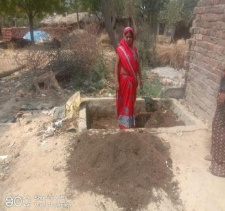In Shahpur village, Uttar Pradesh, Urmila faced immense challenges in managing her family and livelihood. Married to Nankararam, with four children—three daughters and one son—she struggled to make ends meet with just one acre of land. The family’s financial situation was dire, and meeting even basic expenses was a constant struggle.
Everything changed when Neelam, a Self Employed Women’s Association (SEWA) aagewan (community leader), visited the village and introduced Urmila and other women to the concept of organic farming. She explained how organic practices could increase income, reduce dependence on chemical fertilizers, and improve soil health. Inspired by this opportunity, Urmila attended a training session on organic fertilizer production, where she learned to create her own compost. This SEWA initiative is supported by the APFP-FO4A program.
Eager to put her knowledge into practice, she began producing organic fertilizers on her farm. She experimented with different composting methods and, over time, refined her process. As her confidence grew, she started selling the organic fertilizers to others in the village. This shift to organic farming not only supported her own agricultural practices but also created an additional source of income.
With the extra earnings, Urmila was able to enroll her children in a private school, ensuring them a better education. She also opened a small grocery shop, further strengthening her family’s financial stability. These improvements elevated their standard of living and significantly reduced her financial stress.
Grateful for the training and support from SEWA and its community leaders, Urmila believes organic farming has empowered her and brought hope to her family. Now, she is eager to share her success story with other women, inspiring them to adopt organic farming practices for better income and overall well-being.
APFP-FO4A is implemented by the consortium Asian Farmers’ Association for Sustainable Rural Development (AFA) and La Via Campesina (LVC) and funded by the European Union and the International Fund for Agricultural Development (IFAD).




Comments are closed